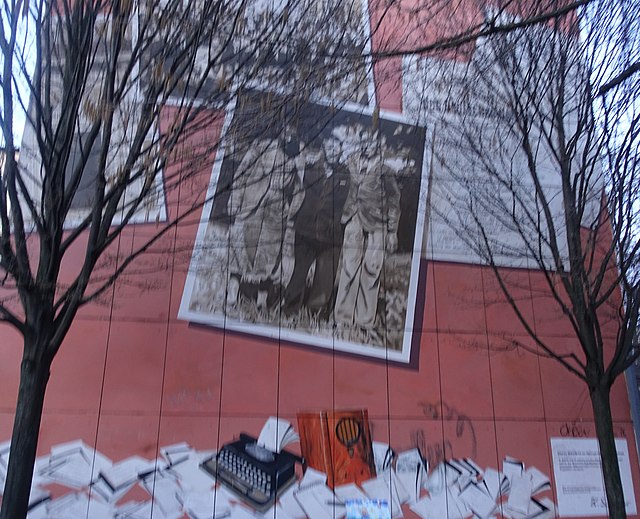Image citation: Wandbild in St. Georg zu Helmuth Hübener, licensed under Wikimedia commons
Today, 62% of Americans have political views they are afraid to share. Despite the extensive legal protections for freedom of speech in America. I worry the attitude and spirit of freedom will decay despite legal guarantees. To remedy this, I believe it is important to learn about the example of Helmuth Hübener, a German teenager who defied the Nazi regime and became a martyr for freedom.
Alongside his friends, he spoke out when a minuscule number would. Despite the danger and futility of resisting the Nazi regime at the time, his conscience urged him to speak out. Most of us are not in such danger, yet we make copious excuses for why we do not speak out against injustices.
When the state is equipped with arbitrary power with no limits, the historical record shows bloodshed and misery follow. Witnessing the state’s potential for brutality after surviving three years in four concentration camps, psychiatrist Victor Frankl wrote: “Since Auschwitz we know what man is capable of. And since Hiroshima we know what is at stake.” However, when faced with the colossally powerful state, as an enemy, we as individuals feel powerless. For most, acquiescence to tyranny is seen as the only option for anything else will attract only persecution and likely death.
Despite lasting only twelve years, the Nazi regime used a vicious racist ideology backed by the power of the modern centralized nation-state that brought the death of millions. It is a terrifying thought that the Weimar Republic collapsed and morphed into one of the most horrifying regimes on the planet in a little over a decade.
Václav Havel, an anti-communist dissident and eventual president of the Czech Republic, wrote that “one does not become a dissident just because they decide to one day” it is because “You are thrown into it by your personal sense of responsibility, combined with a complex set of external circumstances.” Valclav’s observations find fruit in the life of a young, bookish member of the German Church of Latter-day Saints (LDS), Helmuth Hübener, a teenager who became an unexpected dissident when speaking the truth was treasonous.
Helmuth was not a Nazi supporter but as was the case for all kids of his age, joining the Hitler Youth and espousing pro Nazi narratives in school exams were mandatory. A high achiever in school, Helmuth landed a coveted local civil service job working for a government social welfare agency.
Though his employment had advantages, giving him access to an extensive library of books, many of which were banned to the public. Helmuth began to see every facet of life be invaded by the ideology of the Nazi party, even in his local church.
The day Germany started World War II by invading Poland, Nazi Propaganda Minister Joseph Goebbels announced the Extraordinary Radio Measures (ERM), a decree making listening to foreign radio stations a crime punishable by imprisonment. Five years his elder, Gerhard Kunkel, Helmuth’s half-brother, served in the Reich Labor Service and bought a much more powerful radio than the commonly owned Volksemfänger that was intentionally designed to limit the listener’s broadcast stations, especially foreign broadcasts. Effectively defying the ERM law, Helmuth used his brother’s radio to tune into a BBC German language broadcast. He immediately noticed that the BBC broadcast discussed the losses of British troops, something the Nazi-controlled media never touched upon. Helmuth had always listened skeptically to the official news reports of Operation Barbarossa, which never mentioned German casualties.
Realizing earlier than most that German victory was near impossible, Helmuth became a dissident and began writing pamphlets denouncing the Nazi regime as an inhuman evil regime that would lead the German people to ever increasing levels of cruelty and violence. Initially, he recruited two fellow members of the LDS church Karl-Heinz Schnibbe and Rudi Wobbe; later recruiting Gerhard Düwer.
Using printing supplies from his job within the government and a typewriter from church, Helmuth and his friends began to produce and distribute pamphlets urging the German public to reject Nazi rule. For eight months, Helmuth, Karl, Rudi, and Gerhard stuffed their pamphlets into letter boxes, telephone booths, and even the coats of Nazi officials, with essays entitled Hitler the Murderer, Hitler Is the Guilty One, and Don’t Believe the Nazi Party.
Helmuth wrote about Nazi war crimes and how the regime constantly lied to its citizens. In his pamphlets, he urged the German public to take responsibility for the regime’s crimes and advocated for a revolution of conscience. He insulted the Nazi regime through satire and poetry, mocking their propaganda. When the government could not supply their troops in Russia with winter clothes, Helmuth wrote a poem criticizing the Reich:
“Yes, Hitler’s the reason the people must share
From their meager belongings whatever they’ll bear!
For Hitler’s mistakes the Volk must now pay,
What good now is Russia, it’s lost anyway.
And that Stalin now marches the victor in the war,
The Führer neglected to calculate for.”
Helmuth did not hide his hatred for Hitler, calling him “the people’s seducer,” “people’s corruptor,” and the “people’s traitor.” Helmuth’s writings are not the result of moody adolescence but a full-fledged anti-Nazi stance. He was the real deal, a dissident of the regime, one of the youngest Germany had ever seen.
On February 4th, 1942, one of Helmuth’’s coworkers reported him to the authorities. Although Helmuth, Karl, Rudi, and Gerhard had made a pact that they would accept full responsibility for writing and distributing the leaflets if any of them were caught, Helmuth, a bookish unathletic 17 year old, resisted 5 days of Gestapo interrogation beatings and torture before he surrendered the names of his friends.
Initially, Helmuth’s interrogators tried to get the names of the adults they thought were organizing this clandestine movement. Gestapo leaders could not believe that someone so young had orchestrated this campaign for so long without any adult assistance. Helmuth’s trial took place in Nazi Germany’s highest court, the People’s Court, known for liberally applying the death penalty. Even juveniles were not safe; from 1933 to 1945, at least sixty-nine juveniles were indicted for treason before the People’s Court.
After their arrest, Karl, Rudi, and Helmuth were held in solitary confinement for six months. At their trial of 11 August 1942, all were convicted of defying restrictions on free speech in the Decree of the Reich President for the Protection of the German People and subsequent draconian decrees, passed by the Nazi regime in 1933 after just weeks in office.
Karl-Heinz Schnibbe received four years in a labor camp, Rudi Wobbe five years, and Gerhard Düwer seven years for distributing pamphlets in communist neighborhoods. However, the most severe sentence was reserved for Helmuth, who openly showed his disdain for the Nazi regime during his trial. One judge asked him, “Young man, do you honestly believe Germany will lose the war? Helmuth responded: “Don’t you?” When another asked if he thought German broadcasts were wrong and the English ones were correct, Helmuth answered, “Exactly.”
For his open defiance of and his campaign against the Nazi regime, Helmuth was executed on October 27th 1942. He was not the only person to be beheaded by guillotine, but he was the youngest person officially executed by the Nazi regime. The next day, his mother’s birthday, she learned of his death from a poster.
Though tragic, Helmuth Hübener’s story shows us that resistance to oppression and tyranny can spring from the most unlikely sources. The authorities could not fathom that a group of teenagers had eluded and frustrated them for months. Helmuth and his friends embarrassed the Gestapo by showing that a few teenagers with a typewriter could frustrate and elude their oppressors for months.
Helmuth died and his actions did not lead to the destruction of the National Socialists. Why bother risking your life for an act of defiance that will not defeat your enemies?
Resistance terrifies tyrants, who constantly need to show power to assert their dominance. They are really just one person. Any resistance, regardless of scale, terrifies authority. The simple knowledge one person will not obey undermines the whole system which is based on complete acquiescence.








